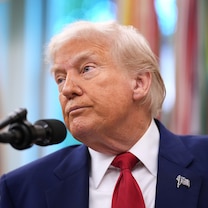As states play 'Me First,' primaries fall into chaos
A political showdown has formed over which states will be 'first in the nation.'
CONCORD, N.H. -- Don't be fooled by the mild manner and balding pate: William Gardner just might be the most powerful person in American politics at the moment.
For three decades, the little-known New Hampshire secretary of State has had the sole authority to set the date of the Granite State's first-in-the-nation presidential primary — an early-in-the-year contest that has been the single most decisive event in determining who gets nominated.
Now moves by Florida and other states to get the attention traditionally lavished on New Hampshire and Iowa, which holds the opening caucuses, has created a train wreck of an election calendar and a high-stakes political showdown. It also has increased the odds that the 2008 nominations for president could be decided before Valentine's Day.
A Democratic National Committee panel voted Saturday to strip Florida of its convention delegates unless it moves back its primary from Jan. 29, but there are no signs the state will comply. If nothing gives, Democratic presidential candidates will face an unusual dilemma: commit to spending valuable time and money to compete in a beauty-pageant election that won't build their delegate count, or essentially ignore the nation's fourth-most-populous state — the one that decided the 2000 election.
Meanwhile, Iowa's caucuses, required by state law to move earlier and maintain the state's primacy in the nominating process, will be competing with New Year's Eve for attention. In any case, the crush of more than 20 states now scheduled to vote on Feb. 5 means the nominees in both parties could be apparent by the next morning.
There are other unintended consequences of the compressed 2008 schedule: The odds of a long shot winning a nomination — as Democrat Jimmy Carter did in 1976 — have gotten longer. And public financing of presidential elections, a post-Watergate reform, is effectively dead because nominees won't be able to wait until the end of summer to get federal funds and begin spending money.
Through it all, Iowa and New Hampshire are likely to be more important than ever. The momentum that victories in those states can provide will be enhanced by the rush of contests that follow.
That suits Gardner fine. He argues that New Hampshire, which has held the nation's first primary since 1920, has a distinctive political culture makes it uniquely qualified to winnow the field of would-be presidents. "There's a reason the Kentucky Derby is in Kentucky," he says in an interview in his cluttered corner office on the second floor of the state Capitol. "Is it not fair that New York Harbor always has the Statue of Liberty?"
While he's serenely confident New Hampshire will hold the first primary — state law mandates it — Gardner hasn't decided precisely when that will be. As Labor Day looms, the traditional starting point of a political season, campaigns are scheduling candidates' travel, buying TV ads, deploying field workers and devising get-out-the-vote drives based on their best guesses of when the first contests will be.
"You want to know what the track is that you have to run the race on," says David Plouffe, campaign manager for Democratic contender Barack Obama, calling the uncertainty "frustrating."









